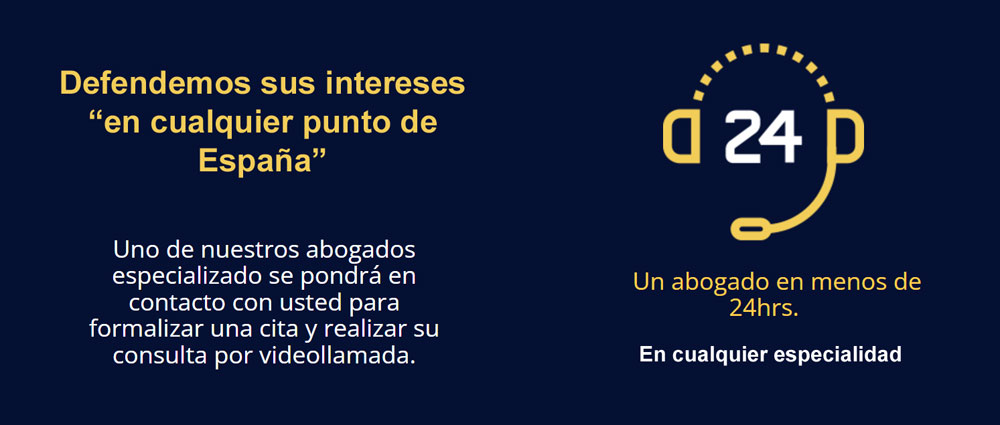
Table of contents
All legal proceedings entail a series of expenses. On the one hand, we must talk about procedural costs, which are those directly and immediately related to the legal proceedings. On the other hand, legal costs. We would like to focus this article on them.
What are court costs?
Court costs are the expenses necessary for a trial to take place. They cover the period from the beginning of the proceedings until the end of the proceedings. They are included in Article 241 of the Civil Procedure Act. They are as follows:
- The fees of lawyers and solicitors when it is necessary for them to intervene.
- The fees of court experts.
- The cost of inserting compulsory notices or announcements during the proceedings.
- Fees that must be paid for the implementation of necessary actions during the course of the proceedings.
- Where applicable, the jurisdictional authority fee.
- All documents that must be requested in accordance with the legislation in force (certificates, notes, testimonies, official copies, etc.).
- The only exception is public records and registers requested by the court.
Who pays the costs of a trial?
The answer to the question of who pays the costs of a civil lawsuit is answered in Article 241.1 of the Civil Procedure Act (Ley de Enjuiciamiento Civil). Specifically, it establishes that each party shall pay the costs that correspond to them whenever they are caused at their request. With the exception, as we will see below, of an order for costs, i.e. the judgement obliges the party whose claims have been rejected to pay these costs to the party whose claims have been upheld.
Orders the parties to pay the costs
In order for the winning party to be able to claim the costs of a trial from the losing party, it is necessary that the judgement explicitly allows for this. If it does not, or if it contains phrases such as "each party shall pay the costs incurred at its own request" or "without making a special pronouncement on costs", each party must pay its own costs.
Nor should we forget that, if the losing party is a beneficiary of legal aid, he or she cannot be asked to pay them. This is common in certain cases, for example, when answering the question of who pays the costs of an eviction trial.
In any case, if we assume that the judgment condemns the losing party to pay the costs of the legal proceedings, we have to resort to article 394 of the Spanish Civil Procedure Act (Ley de Enjuiciamiento Civil). It establishes that the procedure necessary to request payment begins with the assessment of costs.
It should be noted that, when the judge has doubts in accordance with the law or does not fully agree with the winning party, he never awards costs. Let us take an example. If one man claims €10,000 from another for whatever reason but the judge finally only orders the losing party to pay €7,000, he will never make him pay these kinds of costs.
How much in court costs?
This is virtually impossible to determine. According to official data, the European Union estimates that, on average, a trial involves costs of €3,000. However, these can be much higher depending on how long it takes. That is why, before starting the procedure, many people wonder how to know if they will win a trial. Unfortunately, although there may be a greater or lesser chance, this question cannot be answered with certainty either.
What happens if I do not pay the costs of a lawsuit?
We already know, albeit approximately, how much the costs of a trial are. Now it is time to learn how the payment is made. Specifically, the winning party has to claim the payment of the amount by means of the appraisal of costs, after which the losing party is obliged to make the payment within a maximum period of 20 working days.
The problem is that sometimes the losing party does not want to pay the costs of an oral trial. Or simply does not have the financial means to do so. In this case, the winning party may initiate enforcement proceedings, which will entail the seizure of his or her assets. That is, provided that he cannot avail himself of any of the exceptions provided for by law.
One note before I finish. Many people have doubts about who pays the costs of a misdemeanour trial. However, in this type of proceedings it is not compulsory to have a lawyer and a solicitor. Therefore, even if both parties appear with them, it will not be possible to claim these costs from either of them once the judgement is issued.
In short, the costs of a lawsuit cover all the expenses arising from the proceedings. In some cases, the judge may order the losing party to pay them. If you are going through a similar situation and need advice, we recommend that you consult a criminal lawyer who will explain any doubts in detail. We hope we have made it clear in this article in which cases this can happen and how to enforce them if necessary.

"Anywhere in Spain"
With our online appointment system you will have immediate advice without the need for face-to-face visits or travel.
One of our lawyers specialized in your area of interest will contact you to formalize an appointment and make your consultation by video call.

